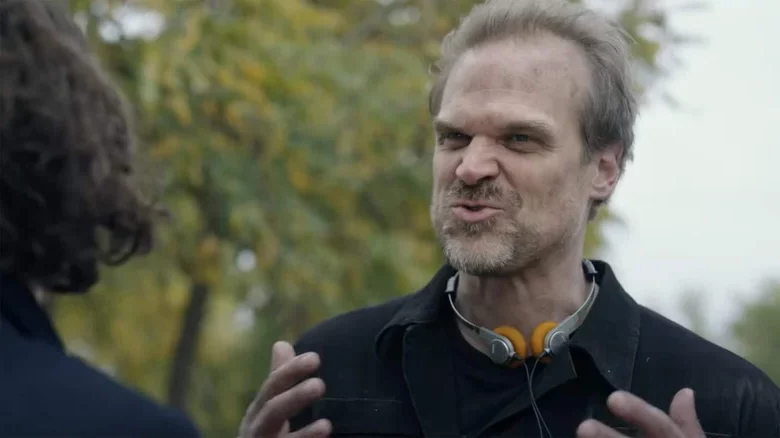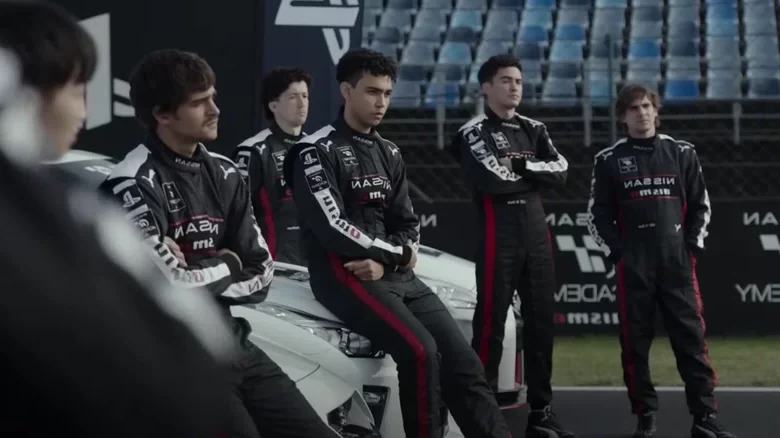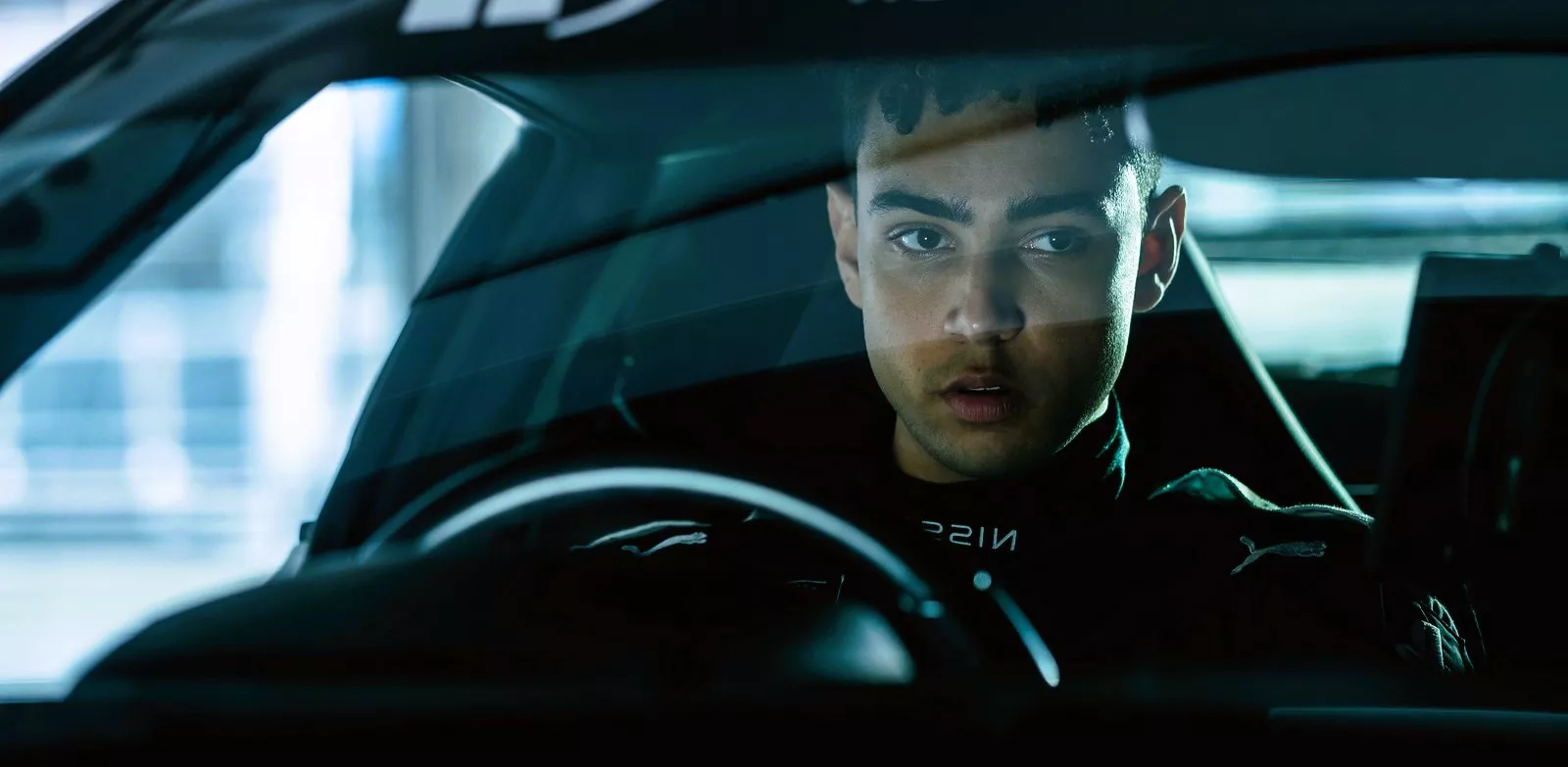2023 marks the era of cinematic brand biopics, where renowned companies and products take center stage in thinly-disguised ads transformed into inspiring tales of triumph against all odds. After rallying behind corporate underdogs like Nike, Nintendo, and Frito-Lay, viewers are now prompted to champion yet another improbable business conquest, cleverly packaged as a classic rags-to-riches sports narrative.
Upon initial inspection, Neill Blomkamp’s “Gran Turismo” appears primarily focused on the journey of Jann Mardenborough (played by Archie Madekwe), a gamer who defied expectations to conquer the racetrack. A closer look reveals that Blomkamp, along with screenwriters Jason Hall and Zach Baylin, could have easily applied the same formulaic success story template to any of the achievements from GT Academy. The film’s emphasis lies less in delving deeply into the driver’s personal narrative and more in accentuating the audacious gamble taken by an automaker to invest in the realm of video gaming.
Dramatic Racing Illusions

In a surprising turn, David Harbour’s portrayal of the cantankerous mentor Jack Salter in the film “Mardenborough’s Drive” breathes life into the expected sports movie formula. As an unlikely contender, the film navigates familiar sports movie tropes, culminating in a triumphant podium finish at a major race. Harbour’s onscreen presence, particularly during pivotal moments, injects genuine racing drama into the narrative, offering a refreshing take on the conventional genre while distancing itself from being a mere extension of the “Gran Turismo” game franchise.
Harbour’s character embodies the archetypal coach, a foundation that lends the film an illusion of dramatic depth. Yet, these instances are offset by recurrent reminders of the game’s origins and Nissan’s corporate initiatives, which momentarily puncture the film’s immersive storytelling. While this era of cinema is unapologetically shaped by corporate interests, “Mardenborough’s Drive” falls short in concealing its commercial intent compared to its genre counterparts.
The film introduces us to Jann, portrayed as a teenager grappling with the transition into adulthood. His unwavering dedication to his “Gran Turismo” games raises concerns from his father (Djimon Hounsou), who questions his lack of real-world ambitions. Meanwhile, his mother (Geri Halliwell, popularly known as Ginger from the Spice Girls) is puzzled by his decision to abandon a university engineering degree in favor of a career linked to automobiles.
As fate would have it, Jann is selected to participate in a gaming competition orchestrated by the enigmatic Danny Moore (played by Orlando Bloom). This contest promises a chance to attend GT Academy and receive training as a professional racer. For a character initially reluctant to invest the effort required to pursue his dreams, this opportunity becomes a pivotal moment to challenge his doubting parents. The film admirably adheres to the “Rocky” principle, accentuating incremental triumphs in Jann’s arduous journey, thereby heightening their significance.
In summary, the movie “Mardenborough’s Drive” transcends conventional expectations thanks to David Harbour’s remarkable portrayal of Jack Salter. His performance injects vitality into familiar sports movie elements, offering a fresh perspective on the genre while grappling with corporate influences. While occasionally marred by its commercial undertones, the film navigates the story of an unconventional racer’s ascent with a blend of dramatic weight and well-earned victories.
Gran Turismo Balances Sports Movie Trope with Overt Product Promotion

While the bulk of the narrative in “Gran Turismo” adheres to the well-worn tracks of a stereotypical sports movie, it simultaneously serves as an unabashed advertisement for a highly touted “realistic racing simulator.” Amidst the clichéd moments, subtle details subtly tout the prowess of the game. An early race at the academy showcases an unconventional twist—Jann’s brake failure-induced accident vindicates his reliance on his extensive engineering insights gleaned from playing “Gran Turismo.”
In a peculiar narrative choice, this scene effectively rebuffs any notion that traditional education and training hold the exclusive key to success on the track. Instead, it asserts that mastering a console controller could be the pathway to triumph, encouraging aspiring drivers in the audience to contemplate similar prospects. Even in defeat, Jann stages rapid rebounds by recalibrating lessons from the game, envisioning himself on the virtual racetrack to surge ahead of competitors, who would blush to be bested by a PlayStation virtuoso. The movie’s obsession with the game’s tutelage reaches its zenith, with Jann’s best performances closely aligned with lessons absorbed from the “racing simulator,” culminating in a remarkably shameless display of video game product placement.
The director, Neill Blomkamp, employs creative measures to visualize Jann’s symbiotic relationship with his video game obsession, emblazoning racing tracks with “Gran Turismo” iconography—position indicators, for instance, hovering above Jann’s car to convey his leaderboard placement. Despite these efforts, the film falters in conveying the races with the same dynamism as the game itself, hindered by rapid-fire editing that sacrifices spatial coherence, making it challenging to comprehend the track’s layout. The film’s haste to reach the checkered flag undermines the tension that such sequences require.
As Jann ascends to major competitions, Blomkamp’s direction grows increasingly audacious, deploying drone shots capturing spectators and track bends. Unfortunately, the frenzied editing occasionally obfuscates the race’s progression. Clarity emerges only in the climactic Le Mans 24-hour race, a segment reminiscent of “Ford v Ferrari.” The familiar narrative trajectory serves as a saving grace, rescuing the sequence from incoherence. Blomkamp’s emphasis on visual aesthetics, though stylish, hinders narrative coherence in favor of flashy race scenes.
While general audiences may find “Gran Turismo” more forgiving, my scrutiny uncovers its conspicuous corporate agenda, a blemish that proved harder to overlook than anticipated. Amidst a year already notorious for overtly masked commercials infiltrating our screens, the film’s unapologetic corporate disposition taints its appeal.
“Gran Turismo” races into theaters on August 25th.
